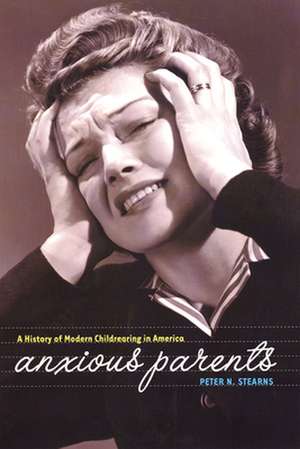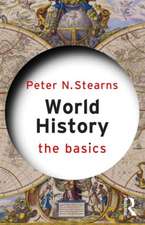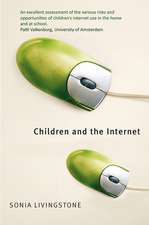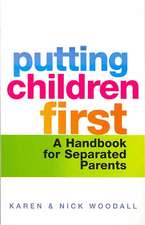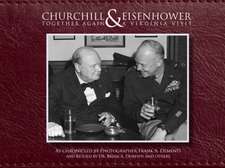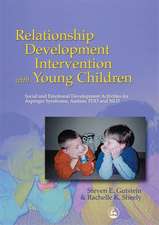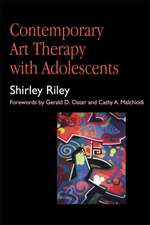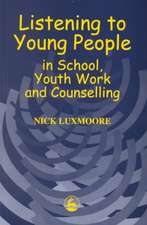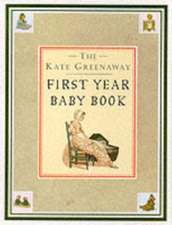Anxious Parents – A History of Modern Childrearing in America
Autor Peter N. Stearnsen Limba Engleză Hardback – 30 apr 2003
| Toate formatele și edițiile | Preț | Express |
|---|---|---|
| Paperback (1) | 225.71 lei 6-8 săpt. | |
| MI – New York University – 31 oct 2004 | 225.71 lei 6-8 săpt. | |
| Hardback (1) | 526.01 lei 6-8 săpt. | |
| Wiley – 30 apr 2003 | 526.01 lei 6-8 săpt. |
Preț: 526.01 lei
Preț vechi: 683.13 lei
-23% Nou
Puncte Express: 789
Preț estimativ în valută:
100.65€ • 105.09$ • 83.30£
100.65€ • 105.09$ • 83.30£
Carte tipărită la comandă
Livrare economică 04-18 aprilie
Preluare comenzi: 021 569.72.76
Specificații
ISBN-13: 9780814798294
ISBN-10: 0814798292
Pagini: 252
Dimensiuni: 159 x 235 x 25 mm
Greutate: 0.5 kg
Ediția:New.
Editura: Wiley
ISBN-10: 0814798292
Pagini: 252
Dimensiuni: 159 x 235 x 25 mm
Greutate: 0.5 kg
Ediția:New.
Editura: Wiley
Recenzii
"The book is more than a synthesis of existing scholarship. It is a compendium of ideas - some personal, mostly scholarly - about the experience of parenting in the United States since the beginning of the twentieth century. The book is imaginative and thought provoking."History of Education Quarterly "In what is his trademark style, Stearns creates an artful synthesis that is both revelatory and captivating. An at times unsettling analysis of parental angst, the book is replete with worthy insights for historians and contemporary parents alike."The Journal of American History "Anxiety is the hallmark of contemporary parenting. Today's parents are tormented by fears of Sudden Infant Death Syndrome, child abductions, and juvenile drug and alcohol use. In perhaps his most timely and exciting book, Peter N. Stearns explains with wit and humane insight how modern mothers and fathers came to agonize incessantly about children's personality development, school performance, and psychological well-being."
Steven Mintz, University of Houston "Stearns . . . argues that over the course of the twentieth century, a kind of down-home, common-sense confidence in the basic sturdiness of children in general was replaced by an idea of the child as psychologically and socially vulnerable."
Ruminator Review "Stearns takes readers on tour through a wondrous variety of twentieth-century worries about children."
American Historical Review "Grounded in research, this study offers insights into such school-related developments as the rise of grade inflation, the growth of parental ambivalence toward the schools, and the influence of escapist entertainment on learning and social development."
Education Week "A strong, effective, and readable portrayal of how twentieth-century American parents have invested and over-invested in their children. In a fairly short compass, Stearns has demonstrated many of the things that historians have tended to belabor-the role of expertise, why despite their declining numbers, children have become so important socially, the new realm of consumption, how the anxiety about children has become a central matter in twentieth-century culture and even an identifier of American life. Stearns knows what is going on and that children are not a means to express other anxieties, but the very source of many of the anxieties we express."
Paula S. Fass, University of California, Berkeley "Stearns has put a lot of thought into this dense but elegantly argued and thoroughly researched volume, and it should become a classic in the study of American childhood."
Publishers Weekly "Stearns points to a number of contemporary phenomena, each of which he considers an expression of parental anxiety. Steans appears to be particularly sensitive to the upward mobility of kids' grades."
The New York Review of Books "It's a shame that many new parents may not have time to read Peter N. Stearn's Anxious Parents: A History of Modern Childrearing in America."
The Atlantic Monthly "Stearns is a prolific historian."
The Chicago Tribune "Recommended."
CHOICE "Engaging and well written."
History "(Stearns) has a keen appreciation of what really mattered to 20th-century Americans, in their families and beyond. Indeed, it is his easy command of all that was going on outside the home- and his profound grasp of the connectedness of those larger developments and their consequences for childreaing- that sets his study apart from other histories of the modern American family." Journal of Social History "The book is as useful to scholars as it is informative to the general public....beautifully written and thoroughly interesting."
Metapsychology Online Book Reviews
"The book is more than a synthesis of existing scholarship. It is a compendium of ideas - some personal, mostly scholarly - about the experience of parenting in the United States since the beginning of the twentieth century. The book is imaginative and thought provoking."--History of Education Quarterly "In what is his trademark style, Stearns creates an artful synthesis that is both revelatory and captivating. An at times unsettling analysis of parental angst, the book is replete with worthy insights for historians and contemporary parents alike."--The Journal of American History "Anxiety is the hallmark of contemporary parenting. Today's parents are tormented by fears of Sudden Infant Death Syndrome, child abductions, and juvenile drug and alcohol use. In perhaps his most timely and exciting book, Peter N. Stearns explains with wit and humane insight how modern mothers and fathers came to agonize incessantly about children's personality development, school performance, and psychological well-being." --Steven Mintz, University of Houston "Stearns ... argues that over the course of the twentieth century, a kind of down-home, common-sense confidence in the basic sturdiness of children in general was replaced by an idea of the child as psychologically and socially vulnerable." --Ruminator Review "Stearns takes readers on tour through a wondrous variety of twentieth-century worries about children." --American Historical Review "Grounded in research, this study offers insights into such school-related developments as the rise of grade inflation, the growth of parental ambivalence toward the schools, and the influence of escapist entertainment on learning and social development." --Education Week "A strong, effective, and readable portrayal of how twentieth-century American parents have invested and over-invested in their children. In a fairly short compass, Stearns has demonstrated many of the things that historians have tended to belabor-the role of expertise, why despite their declining numbers, children have become so important socially, the new realm of consumption, how the anxiety about children has become a central matter in twentieth-century culture and even an identifier of American life. Stearns knows what is going on and that children are not a means to express other anxieties, but the very source of many of the anxieties we express." --Paula S. Fass, University of California, Berkeley "Stearns has put a lot of thought into this dense but elegantly argued and thoroughly researched volume, and it should become a classic in the study of American childhood." -- Publishers Weekly "Stearns points to a number of contemporary phenomena, each of which he considers an expression of parental anxiety. Steans appears to be particularly sensitive to the upward mobility of kids' grades." --The New York Review of Books "It's a shame that many new parents may not have time to read Peter N. Stearn's Anxious Parents: A History of Modern Childrearing in America." -- The Atlantic Monthly "Stearns is a prolific historian." -- The Chicago Tribune "Recommended." --CHOICE "Engaging and well written." --History "(Stearns) has a keen appreciation of what really mattered to 20th-century Americans, in their families and beyond. Indeed, it is his easy command of all that was going on outside the home- and his profound grasp of the connectedness of those larger developments and their consequences for childreaing- that sets his study apart from other histories of the modern American family." --Journal of Social History "The book is as useful to scholars as it is informative to the general public...beautifully written and thoroughly interesting." --Metapsychology Online Book Reviews
Steven Mintz, University of Houston "Stearns . . . argues that over the course of the twentieth century, a kind of down-home, common-sense confidence in the basic sturdiness of children in general was replaced by an idea of the child as psychologically and socially vulnerable."
Ruminator Review "Stearns takes readers on tour through a wondrous variety of twentieth-century worries about children."
American Historical Review "Grounded in research, this study offers insights into such school-related developments as the rise of grade inflation, the growth of parental ambivalence toward the schools, and the influence of escapist entertainment on learning and social development."
Education Week "A strong, effective, and readable portrayal of how twentieth-century American parents have invested and over-invested in their children. In a fairly short compass, Stearns has demonstrated many of the things that historians have tended to belabor-the role of expertise, why despite their declining numbers, children have become so important socially, the new realm of consumption, how the anxiety about children has become a central matter in twentieth-century culture and even an identifier of American life. Stearns knows what is going on and that children are not a means to express other anxieties, but the very source of many of the anxieties we express."
Paula S. Fass, University of California, Berkeley "Stearns has put a lot of thought into this dense but elegantly argued and thoroughly researched volume, and it should become a classic in the study of American childhood."
Publishers Weekly "Stearns points to a number of contemporary phenomena, each of which he considers an expression of parental anxiety. Steans appears to be particularly sensitive to the upward mobility of kids' grades."
The New York Review of Books "It's a shame that many new parents may not have time to read Peter N. Stearn's Anxious Parents: A History of Modern Childrearing in America."
The Atlantic Monthly "Stearns is a prolific historian."
The Chicago Tribune "Recommended."
CHOICE "Engaging and well written."
History "(Stearns) has a keen appreciation of what really mattered to 20th-century Americans, in their families and beyond. Indeed, it is his easy command of all that was going on outside the home- and his profound grasp of the connectedness of those larger developments and their consequences for childreaing- that sets his study apart from other histories of the modern American family." Journal of Social History "The book is as useful to scholars as it is informative to the general public....beautifully written and thoroughly interesting."
Metapsychology Online Book Reviews
"The book is more than a synthesis of existing scholarship. It is a compendium of ideas - some personal, mostly scholarly - about the experience of parenting in the United States since the beginning of the twentieth century. The book is imaginative and thought provoking."--History of Education Quarterly "In what is his trademark style, Stearns creates an artful synthesis that is both revelatory and captivating. An at times unsettling analysis of parental angst, the book is replete with worthy insights for historians and contemporary parents alike."--The Journal of American History "Anxiety is the hallmark of contemporary parenting. Today's parents are tormented by fears of Sudden Infant Death Syndrome, child abductions, and juvenile drug and alcohol use. In perhaps his most timely and exciting book, Peter N. Stearns explains with wit and humane insight how modern mothers and fathers came to agonize incessantly about children's personality development, school performance, and psychological well-being." --Steven Mintz, University of Houston "Stearns ... argues that over the course of the twentieth century, a kind of down-home, common-sense confidence in the basic sturdiness of children in general was replaced by an idea of the child as psychologically and socially vulnerable." --Ruminator Review "Stearns takes readers on tour through a wondrous variety of twentieth-century worries about children." --American Historical Review "Grounded in research, this study offers insights into such school-related developments as the rise of grade inflation, the growth of parental ambivalence toward the schools, and the influence of escapist entertainment on learning and social development." --Education Week "A strong, effective, and readable portrayal of how twentieth-century American parents have invested and over-invested in their children. In a fairly short compass, Stearns has demonstrated many of the things that historians have tended to belabor-the role of expertise, why despite their declining numbers, children have become so important socially, the new realm of consumption, how the anxiety about children has become a central matter in twentieth-century culture and even an identifier of American life. Stearns knows what is going on and that children are not a means to express other anxieties, but the very source of many of the anxieties we express." --Paula S. Fass, University of California, Berkeley "Stearns has put a lot of thought into this dense but elegantly argued and thoroughly researched volume, and it should become a classic in the study of American childhood." -- Publishers Weekly "Stearns points to a number of contemporary phenomena, each of which he considers an expression of parental anxiety. Steans appears to be particularly sensitive to the upward mobility of kids' grades." --The New York Review of Books "It's a shame that many new parents may not have time to read Peter N. Stearn's Anxious Parents: A History of Modern Childrearing in America." -- The Atlantic Monthly "Stearns is a prolific historian." -- The Chicago Tribune "Recommended." --CHOICE "Engaging and well written." --History "(Stearns) has a keen appreciation of what really mattered to 20th-century Americans, in their families and beyond. Indeed, it is his easy command of all that was going on outside the home- and his profound grasp of the connectedness of those larger developments and their consequences for childreaing- that sets his study apart from other histories of the modern American family." --Journal of Social History "The book is as useful to scholars as it is informative to the general public...beautifully written and thoroughly interesting." --Metapsychology Online Book Reviews
Notă biografică
Peter N. Stearns is Provost and University Professor at George Mason University. Since 1967, he has served as editor-in-chief of The Journal of Social History. His numerous books include World History in Documents; American Behavioral History; and Anxious Parents.
